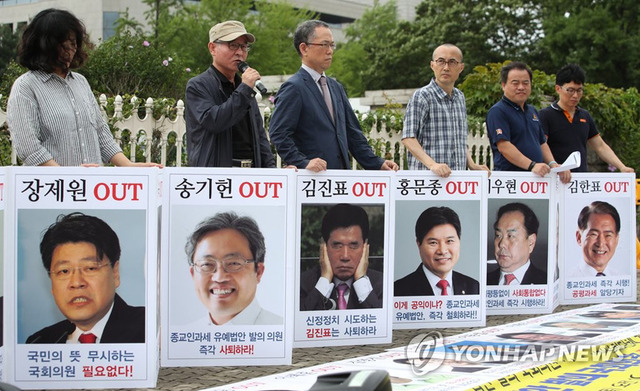Posted on : Dec.17,2017 09:49 KST
 |
|
Members of the Korea Taxpayers Association and other civic groups hold a demonstration outside the National Assembly on Aug. 24 criticizing lawmakers who supported amendments to the Income Tax Law providing privileges to religious figures.
|
Dec. 14 marked the end of the advance notification period for a revision of the enforcement ordinance of the Income Tax Act concerned with taxing religious figures. The advance notification period system is designed so that the details of laws that are closely related to the rights and duties of the public can be announced prior to the enactment or revision of those laws to allow time for public opinion to be consulted.
According to the Ministry of Strategy and Finance, more than a hundred opinions were collected during the advance notification period, which began on Nov. 30, and many of these opinions were critical of privileges given to religious figures, including the scope of tax exemptions and immunity from tax audits.
“The revision to the law does not impose taxes on religious activities, and since the scope of those activities are difficult to specify, this could be exploited to avoid taxes on the entire income of religious figures,” said the Citizens' Coalition for Economic Justice and People's Solidarity for Participatory Democracy. This is a legitimate criticism in light of the first principle of taxation, namely that all income should be taxed, regardless of the source.
These groups also argued that “excluding the books recording religious groups’ expenditures on religious activities from tax audits basically makes it impossible to audit religious figures.” Giving religious figures what is basically a free pass from tax audits contradicts the principle of tax equality, and as such this provision should be eliminated as well. The Korea Taxpayers’ Association went a step further by arguing that “the revision to the enforcement decree is invalid because it provides religious figures with excessive privileges that go beyond the scope stipulated by the Income Tax Act.”
The reason such a problematic enforcement decree was released is because the Ministry of Strategy and Finance gave in to pressure from certain religious organizations and accepted too many of their demands. South Korean Prime Minister Lee Nak-yeon brought up these issues during the cabinet meeting on Dec. 12 and ordered that they be addressed.
“A comparatively large number of the religious sector’s opinions appear to have been incorporated into the revision of the enforcement decree that has been announced in advance. But the press and civic society also contend that the scope of reportable income for religious figures and the principle of exempting religious organizations from tax audits go against the fair taxation. Please make the minimum adjustments necessary to account for the views of the general public while respecting the opinions of the religious establishment,” Lee said.
The Christian Council of Korea and other conservative protestant organizations fired back with a statement on Dec. 14 that said, “This would mean that a plan that has been devised with such difficulty would be torn to shreds without prior deliberation with the religious community. If the enforcement decree is arbitrarily revised, there will be a severe conflict between church and state and strong resistance to taxation.”
It’s not right for religious figures, who ought to set a good example for the public, to stubbornly cling to their privileges while ignoring public opinion. It’s particularly unseemly for them to apparently threaten the government with a “conflict between church and state” and “resistance to taxation.” This brings disgrace upon all religious figures.
The government is planning to vote on the proposed revision in a cabinet meeting on Dec. 26. The problematic provisions need to be corrected prior to that so that the appropriate taxation of religious figures may take effect next year.
Please direct questions or comments to [english@hani.co.kr]



